Deborah Swift's Blog, page 13
June 18, 2022
De-clutter your description in historical fiction #HistoricalFiction #amwriting
I’ve just been reading a historical novel set back in Tudor times. And I was taken with the fact that often my imagination was held up by unnecessary words. These are words that don’t earn their keep and merely make the prose more verbose. Often these are words about the materials used in the past to make something. Of course they make the book sound ‘historical’ but do they really add anything?
Here are the main culprits. These are not quotations from the book I was reading, but examples, to show you what I mean.
No 1. ‘Wooden’.
‘In the Golden Hind tavern he pulled out a wooden chair and sat down, pulling his earthenware cup towards him.’
So, chairs are usually wooden. If it was made of metal, or upholstered in velvet, or painted bright red, then it might be worth noting. Otherwise, its just unnecessary clutter. Do we need ‘earthenware’ for the cup? Well, I suppose it could be horn, or pewter or gold so perhaps that is a more necessary word. But still, unless it directly impacts the scene, its probably unconscious padding by the author to make it seem ‘historical’.
Want some specific chairs for your book? More about chairs https://antiques.lovetoknow.com/Antique_Chair_Styles
No 2. ‘Iron’
‘He grabbed the iron doorknocker and rapped.’ ‘The door creaked on its iron hinges.’ ‘In the Fleet prison, he grabbed the iron bars in both hands and wondered how it had come to this.’
Doorknockers and hinges and prison bars are usually iron. Telling the reader what they are made of makes it appear as if the writer is trying too hard to spell everything out. The adjective interferes with the directness of the action, and holds us up whilst we try to imagine something that, in fact, we are already imagining.
Want a specific knocker for your book? Photos of iron door knockers that might inspire you https://www.oliverelliott.org/article/miscellaneous/knockers_pics/
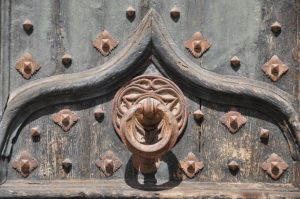
Girona. Cathedral church of Saint Mary. Portal of the apostles. Wooden door with its door knocker and iron decorative nails.1739
No 3. ‘Linen’
‘She tied a linen apron around her waist and began to scrub.’ ‘Her linen petticoats flapped around her ankles as she ran.’
Linen is just too easy. It’s a word designed to simply denote ‘history’. It is probably unnecessary. But much better choices could be made if its important for the reader to know what the apron or petticoats are made of. If poor, an apron could be sacking or hemp, or calico. if rich, petticoats could be starched or sateen or lace-edged. But again, does the description interfere with the action?
Want some language around linen? The Story of Linen – Retting and Rippling https://englishhistoryauthors.blogspot.com/2014/04/retting-and-rippling-story-of-linen.html

Photo by James Kemp on Unsplash
No 4 ‘Cobbled’
‘He pursued him down the cobbled alleyway towards the docks.’ Every novel I read that is set in the past seems to have these generic cobbled streets — from Tudor times right up until the end of the Victorian era — so adding the word ‘cobbled’ adds little to the reader’s understanding of the particular past that they are inhabiting. Readers expect streets in the past to be cobbled. In fact in later eras most of what people call cobbled roads were paved with granite ‘setts’.
I’m not suggesting you should use ‘setts’ as it’s an unfamiliar word to most people, and would cause the reader to stop and ponder instead of getting on with the story. Usually, the road surface is irrelevant unless the person is going to skid on it, trip over it, or hear the rumble of wheels on it as the cart goes by.
Here is an interesting article on those cobbles. http://graceelliot-author.blogspot.com/2015/05/the-cobbled-streets-of-victorian-london.html
Which brings me to ‘cart’ — another of those generic words! Bonus points for suggesting alternative more particular words.
When editing, I try to weed out as many of these what I call ‘historicisms’ as possible, and either cut them or replace with something more specific and relevant. The great enemy of any historical novel is vague generality. As a reader I want to be transported to somewhere vivid and memorable.
The post De-clutter your description in historical fiction #HistoricalFiction #amwriting first appeared on Deborah Swift.
May 10, 2022
Extract from The Admiral’s Wife by MK Tod #CoffeePotBookClub #HistoricalFiction
The Admiral’s Wife
The lives of two women living in Hong Kong more than a century apart are unexpectedly linked by forbidden love and financial scandal.
In 2016, Patricia Findlay leaves a high-powered career to move to Hong Kong, where she hopes to rekindle the bonds of family and embrace the city of her ancestors. Instead, she is overwhelmed by feelings of displacement and depression. To make matters worse, her father, CEO of the family bank, insists that Patricia’s duty is to produce an heir, even though she has suffered three miscarriages.
In 1912, when Isabel Taylor moves to Hong Kong with her husband, Henry, and their young daughter, she struggles to find her place in such a different world and to meet the demands of being the admiral’s wife. At a reception hosted by the governor of Hong Kong, she meets Li Tao-Kai, an influential member of the Chinese community and a man she met a decade earlier when he was a student at Cambridge.
As the story unfolds, each woman must consider where her loyalties lie and what she is prepared to risk for love
“Family secrets and personal ambitions, east and west, collide in this compelling, deeply moving novel.” — Weina Dai Randel, award-winning author of THE LAST ROSE OF SHANGHAI
The Admiral’s Wife – EXTRACT
At 6:00 p.m., Kennedy Road was still crowded along the winding section that cut across Victoria Peak. Hong Kong’s ubiquitous red taxis dodged from lane to lane as they ferried commuters from offices in Sheung Wan, Central, and Wan Chai to apartment buildings that crammed the hillside like an invading army. Patricia stared out the tinted windows of their limousine, idly reading the names mounted on each grand entrance gate: Camelot Heights, Wing Wai Court, Amber Garden, Bamboo Grove.
“You seem moody,” Andrew said.
“Do I?” She turned to look at him. “I’m sorry. I guess I’m still annoyed with my father.”
“Come on, sweetheart. That was more than a week ago. Just ignore him and find a job on your own.” He squeezed her hand. “What’s happened to my strong, capable wife? The woman who could handle tough negotiations with people who had twice as much experience.”
Patricia flashed him a little smile. “You’re right,” she said. “But the whole thing still pisses me off.”
Her husband rubbed the red stubble on his face, a sign that he was weighing his next words. “Should we return to New York?” he asked.
She pushed a strand of long black hair behind one ear. “No, no, no. We can’t go back to the U.S. My father would have a fit. So would my mother. But I’m going nuts with nothing to do.”
During the first three or four months in Hong Kong, Patricia had spent her days organizing their spacious apartment, exploring the city, spending time with her family, and indulging in what she thought of as frivolous pursuits like shopping and weekly pedicures. She had also played tennis, learned mahjong, taken up qigong, and made a few friends. After almost twenty years of working in a demanding career, she’d considered this interlude a well-deserved rest.
Depression had come on unexpectedly. The first sign was difficulty getting out of bed in the morning. General fatigue and irritability had followed, and there were days when she just couldn’t focus. Andrew had encouraged her to go to the doctor. Doctor Leung, her mother’s GP, had prescribed pills but after less than a month Patricia had stopped taking the medication. At the same time, she’d resolved to get back to work.
“I know it’s been difficult,” Andrew said. He took her hand again and ran his thumb across her fingers. “You’ll find something. But please don’t antagonize your father tonight. I’m finally making headway at the bank. I think he’s even beginning to appreciate my skills, which is an improvement over resenting me. If he believes he can trust me, there could be more opportunity here than back home. And more money. I have to think of the kids.”
“I wish we could see them,” she said. Sadness surged across her chest.
“So do I. Very much. But they’ll be here for Christmas.”
Andrew’s ex-wife had primary custody of his two children. When Patricia and Andrew lived in New York, Steven and Emma had spent every other weekend with them, but now that they were in Hong Kong, visits could only be scheduled during summer holidays, spring break, and Christmas, unless business took Andrew to the U.S. After agonizing over the decision, she and Andrew had agreed to restrict their relocation to three years. They both missed his children terribly, a sacrifice made more acute by her inability to carry a baby to term.
Patricia looked at her husband, whose pale blue eyes were bloodshot from a string of late nights. She was being unreasonable but couldn’t help herself. Situations that she would have dismissed as trivial when they lived in New York had become major sources of discontent and angst.
“If I had a job . . .” Her voice trailed off. They’d been round and round the topic all week. Andrew was becoming exasperated.
“Well, given your father’s reaction, you should probably wait a while before raising that topic again.” Andrew withdrew his hand and fingered the crease of his dark gray pants. “What about looking outside banking? You’re a great project manager.”
“Maybe,” Patricia said. “But so far, every possibility I’ve found requires Asian experience and fluency in Cantonese or Mandarin.” She sighed. “Dammit. Why does he always make things so difficult?”
“To tell you the truth, I have no idea. Probably because he can. I admire many of your father’s tactics. But I don’t like the way he treats people, especially you.” Andrew’s voice was gentler than before. “Aren’t you seeing someone about that board position?”
“Mm-hmm. Arthur Chung said it’s mine if I want it.” She linked her fingers with Andrew’s. “We’re meeting Friday afternoon for a briefing on the role he wants me to play. I’m sure he only asked me to get a donation from Ah Ba, but it could be interesting.”
Their driver merged the Mercedes onto Queen’s Road East, past hotels and schools along with a Sikh temple and remnants of air-raid tunnels built during the Second World War. Traffic was at a standstill.
“Well, make the best of it for now,” he said. “I’m sure things will get better.”
Patricia knew her husband was trying to be helpful, but his remark felt patronizing. She hated being patronized. Unlike many of her male colleagues who had underestimated her abilities, Andrew had treated her as an equal from the day they’d met. Had their new circumstances changed his perspective? Was she only his equal when they were both working?
After she’d told him about the conversation with her father, Andrew had asked why she’d allowed her parents to persuade her to live in a place that had never been her home. Patricia hadn’t replied. And ever since, the question had hovered, unsettling in its stark clarity.
She loved her parents, despite their idiosyncrasies and traditional ways. And they loved her. Of that she was certain. Eighteen months earlier, when she and Andrew still lived in New York, her mother had ended a lengthy argument about Patricia’s duty to her family by saying, “We’ll be dead soon and then you’ll be sorry you never came back.”
That conversation had been the tipping point. After much debate, Andrew had agreed to try living in Hong Kong. They’d also agreed that if it didn’t work out, they would return to New York. Ever since, she’d felt displaced, torn between Andrew’s world and the Chinese world of her parents. Her husband expected a modern businesswoman with Western values; her parents expected a dutiful Chinese daughter. The two were irreconcilable.
“I wonder when this place is going to feel like home,” Patricia said.
“You’re the one—”
“Yes, I know,” she said. “I’m the one who wanted to move here. I’m just a little out of sorts. But don’t worry. I’ll make nice with my father. You should know, though, that I’m not going to put up with him telling me what to do any longer.”
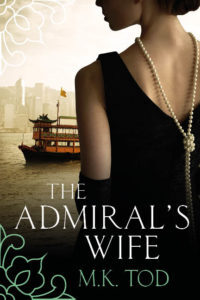 WANT MORE? BUY THE BOOK
WANT MORE? BUY THE BOOK
Connect with Mary:
Website: https://www.mktod.com
Blog: https://www.awriterofhistory.com
Twitter: https://twitter.com/MKTodAuthor
Facebook: https://www.facebook.com/mary.tod.3/
The post Extract from The Admiral’s Wife by MK Tod #CoffeePotBookClub #HistoricalFiction first appeared on Deborah Swift.Review – Letting in the Light by Charlotte Betts #GreatWar #Cornwall @PiatkusBooks
LETTING IN THE LIGHT by Charlotte Betts
1914 Spindrift House, Cornwall
Edith Fairchild’s good-for-nothing husband, Benedict, deserted her when their children were babies. Now the children are almost adult, Edith and Pascal, her faithful lover of two decades, are planning to leave their beloved Spindrift artists’ community and finally be together.
But an explosive encounter between Benedict and Pascal forces old secrets into the light, causing rifts in the happiness and security of the community. Then an assassin’s bullet fired in faraway Sarajevo sets in motion a chain of events that changes everything.
Under the shadow of war, the community struggles to eke out a living. The younger generation enlist or volunteer to support the war effort, facing dangers that seemed unimaginable in the golden summer of 1914.
When it’s all over, will the Spindrift community survive an unexpected threat? And will Edith and Pascal ever be able to fulfil their dream?
REVIEW
I’d been waiting for a few quiet relaxing moments to finish off this trilogy, knowing how much I’d enjoyed the first two parts.
This is the third book in the Spindrift Trilogy set in an artists colony in Cornwall. In this book we see the culmination of all the plot threads that went on in the previous two books, and also how the younger generation are influenced by the mistakes and successes of their parents. We are hooked from the get go, by the fact someone wants to turn the house we all know and love into a hotel, and the action from then on never stops.
Charlotte Betts has an enormous cast of characters to deal with, but such is the quality of the writing that you are always sure who is who, and what their relationship is to the others in the story. The great mix of characters is one of the joys of this novel, from the scheming Gabrielle, and the hateful Benedict, to Edith who is doing her best to hold everything together against the encroaching tide of war and its inevitable changes. There are old family feuds, unrevealed secrets to discover, and of course a love that sustains Edith and Pascal over all the generations. This is a great entertaining novel and I highly recommend it. To get the most from the series though, I suggest you read them all.
PS You’ll probably need tissues for the end.
You can read more about the series here on Charlotte’s website
Follow Charlotte on Twitter @CharlotteBetts1
The post Review – Letting in the Light by Charlotte Betts #GreatWar #Cornwall @PiatkusBooks first appeared on Deborah Swift.May 1, 2022
Extract and Review: The Missionary by Rowena Kinread #Roman #Pagan #Irish #CoffeePotBookClub
Read this atmospheric extract from The Missionary by Rowena Kinread
They trudged on at a steady pace for several hours. Patricius’ initial optimism died rapidly. He had blisters on his toes and heels. The iron shackles had scoured the skin around his ankles, and they were so sore that every step was torture. The goats were no longer patiently obedient but kept stubbornly stopping and trying to munch grass or chomp leaves. Each time they did so, the underking bellowed and let his whip crack. Sometimes the tip nicked Patricius’ back painfully. The track had become narrow in many places where brambles had engulfed the passage, and Patricius’ arms and legs were covered in bloody scratches. They hadn’t passed a single house, farm, village or town. Nor had they seen a single person. When the midges started descending and dusk approached, the light was so poor that Patricius stumbled again and again over tree roots on the ground, scrubbing his knees and nearly losing the goats. The mosquitos began to attack his body, sticky with sweat, and although he tried to wipe them away with his free hand, they feasted upon him, causing swollen red bumps that itched irritably.
The moon had already started to rise in the sky as they emerged from the forest. They entered a glen with rolling hills, and at its base, a small lough. Here they stopped and pitched camp. Orders were shouted back and forth.
The livestock were led to the lakeside to drink and then tethered to trees and fed. Wood was collected and a fire lit. A huge iron pot was suspended on three poles over the fire. The servants boiled water in it and added chunks of meat and vegetables.
Patricius and Domi pointed to their shackles and, motioning with their hands, begged a servant for them to be removed. The servant pointed to the underking, said “Miliucc,” and shook his head.
In the meantime, the underking, Miliucc, had made himself comfortable. He sat on sheepskins, leant his back against a wheel of the wooden cart, and was drinking beer and stroking his dog. He was still wearing his fox stole. When the food was ready, it was brought to him with a loaf of bread. He ate noisily, dipping bread into the stew and slurping. Patricius’ stomach rumbled. He had had nothing to eat all day. Miliucc took his time. When he was eventually satisfied, he fished chunks of meat out of the soup with his grubby fingers and fed them to his dog. She gobbled them up greedily, licking his fingers, whilst Domi, Patricius and the servants watched. Not until she had finished did Miliucc gesture to the servants to take the pot away. The servants fell over the food hungrily, not letting the slaves anywhere near it. Only when they too were finished, were Patricius and Domi allowed to mop up the dregs with a bread crust. Then together, still hungry, Patricius and Domi limped to the lake, washed themselves and cleansed their wounds.
Back at the camp, Patricius used his teeth to rip strips of fabric from his tunic and bandage his ankles, hands and feet. His head was still aching from the blow he had received, and his teeth started to chatter. He edged as near to the fire as he dared, curled up and listened to the leaves rustling in the breeze. Far in the distance, he heard wolves howling, and a grey heron screeched as it flew away from the edge of the lough. He had never felt so afraid and lonely in his entire life.
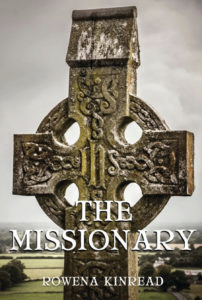 My Review of The Missionary
My Review of The Missionary
This novel fictionalizes the life of St Patrick. It begins in 406 AD when life in Britain is unstable and the formerly Roman lands were subject to invasions by warring tribes. It is a brutal time and one where civilisation meant the keeping of slaves and commonly, the use of women as chattels. In a violent invasion, Patricius is captured and taken as a slave by the Gauls in Hibernia. His horrendous experiences there lead him to want to return later in life and bring the Christian faith of goodness and mercy to their land.
The novel is extremely well researched and well written, with excellent descriptions of ancient Ireland and its way of life. It leads you to consider the idea of magic and miracle in religion, and how these things were used to convert people to God (s). Both genuine experience and trickery can be seen at work in this novel, not least when Patricius must defeat the Druids at their own brand of magic.
Patricius himself is deeply flawed, and an explanation for this choice is made at the end of the book. He has his good points too, a deep love for animals, and a willingness to try to atone for this appalling sin that haunts him. The novel covers his whole life and is a great introduction for anyone who knows little about him. Clear notes explain what is fact and what is fiction.
I recommend this book to all who are interested in Roman, Irish or Christian history, and are prepared to set aside their preconceptions about what a Saint should look like. Thoroughly worth reading.
 About Rowena:
About Rowena:
Rowena Kinread grew up in Ripon, Yorkshire. After leaving school she started working for Lufthansa in Stuttgart. There she met her future husband whom she married in Ripon. After raising 3 children, she began working as a secretary in a private physiotherapy practice. At the same time, she started writing non-fiction books and magazine articles. Retirement finally brought the financial security to start writing full length fiction. A keen interest in history and her own family ancestry inspired her debut novel “The Missionary”, the dramatic story about the life of St.Patrick. A second book “The Scots of Dalriada” will be published this year. Rowena says that she welcomed retirement and all its wonderful opportunities to launch a third career.
Website: rowena-kinread.com Twitter: https://twitter.com/RowenaKinread
The post Extract and Review: The Missionary by Rowena Kinread #Roman #Pagan #Irish #CoffeePotBookClub first appeared on Deborah Swift.April 28, 2022
The Lake Pagoda by Ann Bennett – Read an Extract #WW2 #IndoChina #CoffeePotBookClub #Bookouture
 Read this stunning extract from The Lake Pagoda by Ann Bennett
Read this stunning extract from The Lake Pagoda by Ann Bennett
Chapter 1
Paris, November 1946
Arielle pulled her shawl tightly around her shoulders and stepped out of the entrance to the apartment building and onto the broad pavement of Boulevard St Germaine. An icy wind whipped around her, driving up from the River Seine, funnelled by the tall buildings. She shivered and gritted her teeth against the weather. It was so alien to her, this biting cold air that chilled you to the marrow of your bones. In her native Hanoi, the temperature, even in the cooler months, was always comfortable and she was so used to the sultry heat of that city that this Paris winter was a cruel shock.
Even so, she needed to get out. She couldn’t stay inside the stuffy, cramped apartment a moment longer, and while her father was sleeping it was difficult to do anything in that tiny space without disturbing him. So, each morning she left the building to tramp the streets of this alien city, exploring the alleys of the Latin Quarter, the cobbled lanes and churches of the île de la Cité, the boulevards and gardens of the Eighth Arondissement. And as she walked, she watched the stylish Parisians going about their business, dashing to and fro in fashionable clothes, getting out of taxis, riding on trams, pouring down the steps of the metro. She was trying to understand her new home, to find her place in it, to find some meaningful connection with this great, intimidating city. And there was something else she was searching for too.
Now, as she braced herself against the wind and started walking along the boulevard away from the apartment, she glanced guiltily back up at the windows on the third floor. She always worried when she left Papa alone. What if he were to wake up and call out for her? What if he had one of his coughing fits? But he always encouraged her to go. ‘Go on, explore while I’m resting. You need to get to know the place. You can’t stay cooped up with a sick old man all day. I’ll be fine on my own.’ But still she worried.
She carried on down the road, making for the market in Rue Mouffetard. Cars and buses crawled past belting out fumes. Through the lines of slow-moving traffic wove bicycles and pony traps, army jeeps too. It felt so bleak here and so dull after the vibrant colours of Hanoi; the plane trees that lined the pavements had lost their leaves, their branches stark against the tall, pale buildings, and the sky between them was an ominous slate grey.
She walked past a couple of bus stops without pausing. She’d never yet got on a bus in Paris; she had no idea how they worked and was afraid of drawing attention to herself, even though she told herself it was perfectly safe here to do so. Years of having to keep a low profile in Hanoi had made her fearful of attention from anyone. Not that she need worry here in Paris, people barely noticed her. She could walk in the midst of a crowd as if she didn’t exist. And if anyone’s eyes did happen to light on her, seeing her dark skin and black hair they would quickly flick away, for she was half Vietnamese and it was as if she were invisible to them; a nobody.
ABOUT THE BOOK
Indochina 1945: Arielle, who is half-French, half-Vietnamese, is working as a secretary for the French colonial government when the Japanese storm Hanoi. Although her Asian blood spares her from imprisonment, she is forced to work for the occupiers. The Viet Minh threaten to reveal dark secrets from her past if she won’t pass them information from her new masters.
Drawn ever deeper into the rebels’ dangerous world, will Arielle ever escape the torment of her past? Or will she find love amidst the turmoil of war?
A novel of love, loss, war, and survival against all odds.
BUY THE BOOK or read on #KindleUnlimited
 Ann Bennett was born in Pury End, a small village in Northamptonshire, UK and now lives in Surrey. Her first book, A Daughter’s Quest, originally published as Bamboo Heart, was inspired by her father’s experience as a prisoner of war on the Thai-Burma Railway. The Planter’s Wife (originally Bamboo Island) a Daughter’s Promise and The Homecoming, (formerly Bamboo Road), The Tea Panter’s Club and The Amulet are also about the war in South East Asia, all six making up the Echoes of Empire Collection. Ann is also author of The Runaway Sisters ,The Orphan House, and The Child Without a Home, published by Bookouture. Ann is married with three grown up sons and a granddaughter and works as a lawyer. For more details please visit www.bambooheart.co.uk Twitter: https://twitter.com/annbennett71
Ann Bennett was born in Pury End, a small village in Northamptonshire, UK and now lives in Surrey. Her first book, A Daughter’s Quest, originally published as Bamboo Heart, was inspired by her father’s experience as a prisoner of war on the Thai-Burma Railway. The Planter’s Wife (originally Bamboo Island) a Daughter’s Promise and The Homecoming, (formerly Bamboo Road), The Tea Panter’s Club and The Amulet are also about the war in South East Asia, all six making up the Echoes of Empire Collection. Ann is also author of The Runaway Sisters ,The Orphan House, and The Child Without a Home, published by Bookouture. Ann is married with three grown up sons and a granddaughter and works as a lawyer. For more details please visit www.bambooheart.co.uk Twitter: https://twitter.com/annbennett71
The Stone Rose by Carol McGrath #medieval #historicalfiction #Review @AccentPress
This is the third in the splendid She-Wolves Trilogy and I’ve read them all. This one is about Queen Isabella, wife to Edward II. In my opinion this is the best and a fitting finale to an exploration of women and their role at court. From the opening where we are plunged into All Soul’s Night and every knock at the door could be a horror, to the end, when Isabella is alone and only contemplating the ghost of Edward, her husband and King, we are completely immersed in another world.
The novel benefits from the secondary character, Agnes, a real life stone-mason who is commissioned to carve her tomb and is to tell Isabella’s story and make sure we know the truth. Out in the land, England is recovering from the devastation of the Black Death – something that makes these characters’ lives seem even more fragile., Much of court life is political maneuvering and Carol McGrath manages to keep the tensions up by the use of her characters and their personal concerns. For example, at one point Isabella bemoans the fact that her husband was always happiest away from his castle duties and insists on mixing with the peasants, something she thinks beneath him. Isabella is dismayed too by his choice of companions. Those people who, like me, have studied Shakespeare’s Edward II will know of Piers Gaveston, and he features in this book along with another of the King’s favourites, Hugh Despenser.
Isabella comes across as a strong woman beset by the troubles of a husband whose ear is poisoned by his favourites who have their own agendas. This is a fascinating slice of history to which Carol McGrath does ample justice in this gripping novel. Historical notes at the end explain the choices the author made.
History fans will love this well-researched evocation of court life. Highly recommended.
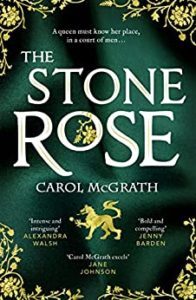
You can BUY the BOOK HERE
Find Carol McGrath on her website www.carolmcgrath.co.uk
Or chat to her on Twitter @carolmcgrath
The post The Stone Rose by Carol McGrath #medieval #historicalfiction #Review @AccentPress first appeared on Deborah Swift.
April 25, 2022
Historical Fiction Spotlight: Beheld by Christopher M Cevasco #AngloSaxons #HistoricalFiction #CoffeePotBookClub
NEW RELEASE! BEHELD ~ Godiva’s Story
by Christopher Cevasco
A darkly twisted psychological thriller exploring the legend of Lady Godiva’s naked ride.
Having survived a grave illness to become one of 11th-century England’s wealthiest landowners, Godgyfu of Coventry (Lady Godiva) remains forever grateful to the town whose patron saint worked such miracles. She vows to rebuild Coventry’s abbey and better the lives of its townsfolk. But the wider kingdom is descending into political turmoil, and her husband, Earl Leofric, starts to break under the strain. Godgyfu finds her own plans unravelling the moment she meets Thomas, a Benedictine novice with perverse secret desires. Three lives become dangerously entangled in a shocking web of ambition, voyeuristic lust, and horrid obsession. Can Godgyfu escape the monk’s menacing wiles and Leofric’s betrayals to secure her future in a changing kingdom? Perhaps, but first she faces a dark test of wills leading her perilously closer to a legendary ride…
Christopher M. Cevasco was born in New Jersey and spent a memorable decade in Brooklyn, New York, but he feels most at home in medieval England, Normandy, Norway, and Greenland. A lifelong passion for history and fiction led him to earn degrees in Medieval Studies and English and later to embark upon a writing career that merges these two loves.
Chris was the founding editor of the award-winning Paradox: The Magazine of Historical and Speculative Fiction from 2003 to 2009. His own short stories appear in Black Static, Beneath Ceaseless Skies, Distant Echoes (Corazon Books, UK), and the Prime Books anthologies Shades of Blue and Gray: Ghosts of the Civil War and Zombies: Shambling Through the Ages.
A long-time member of the Historical Novel Society, Chris currently serves on the society’s North American conference board as registration chair for the upcoming 2023 conference in San Antonio, Texas. Chris lives with his wife and their two children in Myrtle Beach, South Carolina.
Find Chris here:
Website: https://www.christophermcevasco.com
Twitter: https://twitter.com/cevasco_m
Facebook: https://www.facebook.com/christopher.m.cevasco
The post Historical Fiction Spotlight: Beheld by Christopher M Cevasco #AngloSaxons #HistoricalFiction #CoffeePotBookClub first appeared on Deborah Swift.April 19, 2022
Sea of Shadows by Amy Maroney #CoffeePotBookClub #Rhodes #Greece #History
The new novel by Amy Maroney is a stunner. Here is the blurb:
A gifted woman artist. A ruthless Scottish privateer. And an audacious plan that throws them together—with dangerous consequences.No one on the Greek island of Rhodes suspects Anica is responsible for her Venetian father’s exquisite portraits, least of all her wealthy fiancé. But her father’s vision is failing, and with every passing day it’s more difficult to conceal the truth.
When their secret is discovered by a powerful knight of the Order of St. John, Anica must act quickly to salvage her father’s honor and her own future. Desperate, she enlists the help of a fierce Scottish privateer named Drummond. Together, they craft a daring plan to restore her father’s sight.
There’s only one problem—she never imagined falling in love with her accomplice.
Before their plan can unfold, a shocking scandal involving the knights puts Anica’s entire family at risk. Her only hope is to turn to Drummond once again, defying her parents, her betrothed, even the Grand Master of the Knights himself. But can she survive the consequences?
With this captivating tale of passion, courage, and loyalty, Amy Maroney brings a lost, dazzling world to vivid life.
Sea of Shadows is Book 2 in a series of stand-alone historical novels packed with adventure and romance.
This is the second book of this series but can absolutely be read as a stand-alone novel. Historical fiction fans will love the carefully evoked detail of the island of Rhodes, and the two main protagonists, Anica Foscolo an artist desperate to learn to paint in oils, and Drummond Fordun a courageous Scottish privateer. Though this is a romance, there is plenty of action, for Rhodes in the middle ages was a hotbed of piracy, slavery and religious tension. It is also a dangerous place, for here a servant can lose an ear or a hand if they steal or lie.
As well as the main characters, I really appreciated the fully-rounded secondary characters – Heleni, the flirtatious and selfish sister, Aunt Rhea the forthright business woman, and Troilo Salviati from the grasping Florentine family we love to hate, to mention only a few. I don’t want to spoil the plot, as it contains many surprises for the reader to enjoy.
In the novel we learn about the new technique of oil painting, with its imported linseed oil, as well as the life of a man at sea and the defences of the island from invaders by the Knights from the forts around the island. I highly recommend this novel of action, adventure and romance to anyone seeking a well-written historical novel with an unusual setting. A novel that lives up to its cover and won’t disappoint.
READ AN EXCERPT
Summer, 1459
Aegean Sea
The rising sun warmed Drummond Fordun’s back and cast a golden glow on the familiar curves of Rhodes. Shifting waters spread out before him, blue-black as a raven’s wing. He stared mesmerized at the waves for a moment, savoring the dance of light and color. Scotland’s sea had never inspired awe in him as the Aegean did. Then again, all this beauty came with a price.
He glanced over his shoulder at the distant shores of Turkey. No swift Turkish fuste were in pursuit, he saw with relief, but that meant nothing. Infidels could be gathering in coastal villages or quiet coves along those shores even now, preparing their sleek vessels to launch an assault on Rhodes tonight.
Overhead, the sails billowed and snapped in the shifting breeze. The wind had been their ally on thevoyage south to Alexandria. The return journey was a different story. A sudden gale had scattered their convoy like errant twigs, cracking one galley’s mainsail mast. The craft trailed the convoy now, a lame sheep struggling to keep up with the flock. Drummond prayed no further harm would come to the damaged ship or its crew.
He strode to the steps leading to the hold. “I see Rhodes!” he bellowed. “Your wives and families await!”
A cheer went up from the rowers on their benches below decks, soon followed by the lilting refrain of a Greek folk song. As usual, his Rhodian oarsmen brightened at the thought of home—and the extra pay Drummond would portion out as soon as they docked. He knew how to keep his men
loyal.
Drummond signaled to his Genoese first mate, a mercenary who’d seen years of action on these seas and was as handy with a crossbow as he was with a compass. “More power from the starboard oarsmen when the harbor walls come into view,” he ordered. “This wind has half a mind to blow us to the Black Sea.”
“As you command, Captain,” the Genoese said in his best approximation of Scots-accented English.
“Och,” Drummond said. “You’ve been practicing. I’m impressed.”
The man put a hand to his chest and bowed slightly. “Grazie.”
Two gulls appeared over the galley and glided on a current of air near the mainsail mast, studying the men with cold yellow eyes.
“We’ve got nothing for you,” the Genoese informed the birds. “If it’s fish you’re after, or biscuit, you’d best look elsewhere.”
It was true. Their hold was nearly empty. Besides ballast, the last soggy rations, and the ever- present barrels of wine and ale, they’d little to show for the journey. But that was as planned. A small wooden box, a letter for the Order’s grand master from the Mamluk Sultanate of Egypt, and several passengers were the only items of value they’d brought back from Africa.
“The lighter the load, the swifter the journey,” Drummond said. “Once we dock, see that the galley is tied up and put to rights. I’ve got to escort the knights to the palace—if we can get through the crowds. With this merchant fleet coming in, the harbor will be jammed.”
“What about our special guest?” the Genoese asked, jerking his head at the figure shrouded in a dun-colored silk cloak who sat under a canvas shade at the stern of the galley. “Is he a man or a statue, I wonder? Every time I glance his way, he’s sitting like a lump of stone.”
Drummond kept his eyes on the island ahead. “He moves. And talks.”
“You speak to him?” The Genoese looked astonished.
“He’s an interesting fellow.”
“Careful what you say to the man. You know these infidels. Can’t be trusted, no matter how charming they seem.”
Drummond raised an eyebrow. “Who made you the expert on Syrians?”
His crewman shrugged. “Syrians, Turks, Egyptians. They’d slit our throats to a man if given half a chance.”
“In this case, you’re mistaken. He’s saved more lives than you or I can imagine. And Christian ones at that.”
“How so?” The Genoese seemed genuinely mystified.
A gust of wind flapped the sails, died down, then rose again.
“This wind’s no help, and we’re close enough,” Drummond said, ignoring the question. “Have the crew trim the yards and sails.”
The stone towers standing sentinel over Rhodes harbor came into view as the Genoese turned away, dispensing orders to the crew. A fleet of merchant ships was clustered at the entrance to the commercial harbor, which was already crowded with vessels. Small rowboats ferrying goods from the ships to the quays wove in and out of the bobbing crafts. Two light galleys rowed past the chaos, heading toward the Mandraki, the Order’s military harbor.
Drummond drew in a breath and bellowed, “Let’s skim around this tangle of ships and follow those galleys to the Mandraki.”
The familiar sounds of the harbor descended upon them. Men shouting, the clang of iron on rock from the weapons arsenal under construction nearby, the harsh screams of seabirds circling overhead. Citizens of the city streamed through gates in the massive stone walls, attracted by the
arriving fleet.
As they entered the calm waters of the inner harbor, the tension Drummond had carried in his chest ever since they’d left Alexandria began to ease. For a moment, he allowed himself to imagine the night ahead. Dice, cards, a big meal, a visit to the bathhouse, perhaps a few hours in the city’s finest brothel—or a visit to the lovely Genoese courtesan who kept a private apartment near the marketplace. Then a long, peaceful night of rest in his rented chambers near the Inn of the English. The possibilities swam in his mind, tantalizing him.
Reluctantly, he pushed them aside. The first orders of business were tying up the galley, paying his rowers, transferring three of his passengers to the palace, and delivering a letter to the grand master. Only after all of that would he have an opportunity to relax. “Prepare to dock!” he called as the galley slipped through the water toward the quay. “Let’s show the Order how a landing should be done!”
Buy Links: This novel is available on #KindleUnlimited
BUY THE BOOK https://mybook.to/SeaOfShadows
About Amy Maroney
Amy Maroney studied English Literature at Boston University and worked for many years as a writer and editor of nonfiction. She lives in Oregon, U.S.A. with her family. When she’s not diving down research rabbit holes, she enjoys hiking, dancing, traveling, and reading. Amy is the author of The Miramonde Series, an award-winning historical fiction trilogy about a Renaissance-era female artist and the modern-day scholar on her trail. Her new historical suspense/romance series, Sea and Stone Chronicles, is set in medieval Rhodes and Cyprus. Website: https://www.amymaroney.com/
Twitter:@wilaroney
Facebook: www.facebook.com/amymaroneyauthor
The post Sea of Shadows by Amy Maroney #CoffeePotBookClub #Rhodes #Greece #History first appeared on Deborah Swift.April 12, 2022
When the Mermaid Sings by Helen Hollick #Extract #CoffeePotBookClub #ShortStory
When the Mermaid Sings by Helen Hollick
A prequel short read story to the Sea Witch Voyages of Captain Jesamiah Acorne
When the only choice is to run, where do you run to?
When the only sound is the song of the sea, do you listen?
Or do you drown in the embrace of a mermaid?
Throughout childhood, Jesamiah Mereno has suffered the bullying of his elder half-brother. Then, not quite fifteen years old, and on the day they bury their father, Jesamiah hits back. In consequence, he flees his Virginia home, changes his name to Jesamiah Acorne, and joins the crew of his father’s seafaring friend, Captain Malachias Taylor, aboard the privateer, Mermaid.
He makes enemies, sees the ghost of his father, wonders who is the Cornish girl he hears in his mind – and tries to avoid the beguiling lure of a sensuous mermaid…
An early coming-of-age tale of the young Jesamiah Acorne, set in the years before he becomes a pirate and Captain of the Sea Witch.
A DISPATCH FROM THE AUTHOR – HAPPY BIRTHDAY HELEN!
Today, 13th April, is my birthday. (I can’t believe that I’m 69!) so the excerpt I have chosen for today – although a different date – is also my pirate’s birthday. But his is slightly more adventurous than mine!
A brief bit about the Sea Witch Voyages:
I wrote the first Voyage (Sea Witch) back in 2005 after thoroughly enjoying the first Pirates of the Caribbean movie. Like most avid readers, however, I wanted more than just the movie, I wanted to read something that was as entertaining and as exciting. A nautical adventure with a charming rogue of a pirate captain, written for adults (with adult content) but with a dash of supernatural fantasy as well – elements of which had made that first movie such fun to watch. I found many nautical-based novels, but they were all ‘serious stuff’ – Patrick O’Brian, Alexander Kent, C. S.Forrester … all good reads but without the fantasy fun, and barely a female character in sight. I simply could not find the book I wanted to read. So, I wrote my own.
The first Voyage led to more books in the series, and also generated several emails from fans who wanted to know how Jesamiah had become a pirate in the first place. When the Mermaid Sings answers that question.
EXCERPT
Cornwall, England, December 1708
The boy with the black hair had been invading Tiola’s dreams again. She sat in the barn, hidden in the summer-cut hay; she often came here because the smell and the dust made her father sneeze, so he avoided the place, just as she avoided him as much as she could. Her two man-grown brothers had no care for an irritating almost-eight-year-old girl, so neither did they come searching. Her other brothers, Carter and Bennett, nine and three years her elder, preferred to be out in their boat, fishing, unless the Cornish weather was too inclement even for them to tolerate. Her mother knew where and why she sought the solitude, but Mother knew that her only daughter took after her own mother, and respected her especial gift of Fey, and left her to the privacy of
her visionary thoughts. Tiola, named for that same grandmother, was an inquisitive child who behaved older than her years and was full of questions: what are clouds made of? Why is the sky blue? How wide is the sea? Who is the boy I see in my dreams? She had asked that last question only once. The resulting whipping from her father, the Reverend Garrick, had taught her the prudence of silence.
2
She sighed. Her mother was calling for her to come and help with the afternoon chores. All Tiola wanted to know was the identity of the boy with black, curly hair. Boy? No, young man now. He had been a boy when first she had watched him, but last night, in her dream, she had clearly seen that he was growing up, maturing into manhood. She had watched him, in her mind, many times; felt his enjoyment as he dabbled with the gentle flow of the river and sailed, or mended, or painted his boat. Had cringed when the shadow of his brother blotted the sun, wept with him when the cruel bullying left its mark of fear and pain. She knew about that wicked shadow of fear, for her father cast the same shadow. She had saved him, the boy, all those months ago, when he had almost given in to the grief of despair, and surrendered to the malignant presence of Death. She had shouted at him with mind-words: ~ Get up! Fight back! ~ But she needed to know who he was because she had to continue to keep close watch over him. Had to keep him safe. How and why, she was not yet certain, but she would find out, one day. Perhaps soon? Or maybe when she was a woman grown, and this embryonic gift of Craft that she possessed, passed from grandmother to granddaughter, was fully awakened?
Read more: How I met Jesamiah Acorne (the tru-ish) story
Praise :
“Ms Hollick has skillfully picked up the threads that she alludes to in the main books and knitted them together to create a Jesamiah that we really didn’t know.” Richard Tearle senior reviewer, Discovering Diamonds
Find Helen on her website: https://www.helenhollick.net
Social Media: Twitter Facebook

BUT MOST IMPORTANTLY –
BUY THE BOOK:
The post When the Mermaid Sings by Helen Hollick #Extract #CoffeePotBookClub #ShortStory first appeared on Deborah Swift.March 23, 2022
The Carnival of Ash by Tom Beckerlegge #Historical #Fantasy #Renaissance
 Today I’m welcoming Tom Beckerlegge to tell us more about his new literary novel, The Carnival of Ash.
Today I’m welcoming Tom Beckerlegge to tell us more about his new literary novel, The Carnival of Ash.
The Carnival of Ash is a historical fantasy set during the Italian Renaissance in an imaginary city called Cadenza, where poets and scholars as its most important citizens. In the wake of the death of Cadenza’s ruler, the book traces the city’s decline and fall through a series of interlinked tales featuring a cast of would-be writers and warring poets, ink maids, psychotic gravediggers, and more than one set of estranged lovers.
The story opens with the arrival of Carlo Mazzoni at the city’s gates. A young poet from the countryside, Carlo’s hopes of making his name rest on verses he has written inspired by the poem De Incendio Urbis (“On the Burning of the City”) by the ancient Roman poet Lucan. Both Lucan and his poem are real, although the latter is a lost work, leaving much of its contents open to debate. It is known that Lucan had been a friend and favourite of the Emperor Nero: in AD 60, he won a prize for his poetry at the quinquennial Neronia, a lavish festival of sport and the arts. But at some point, there was a falling-out. Classical sources differed on the source of the dispute – according to one, Nero had become jealous of his former friend, and forbade him to publish any more poems; according to another, the emperor disrupted a public reading by Lucan by calling a meeting of the Senate. Whatever the truth, a match had been lit; a feud begun that would end in blood.
 In the summer of AD 64, two-thirds of Rome was destroyed in a devastating fire that burned for more than a week. In De Incendio Urbis, Lucan is thought to have directly accused Nero of being complicit in the inferno. The following year, the poet became involved in the conspiracy organised by Gaius Calpurnius Piso to assassinate the emperor. But their plans were exposed on the morning of the murder and the conspirators were rounded up and tortured. The philosopher Seneca –
In the summer of AD 64, two-thirds of Rome was destroyed in a devastating fire that burned for more than a week. In De Incendio Urbis, Lucan is thought to have directly accused Nero of being complicit in the inferno. The following year, the poet became involved in the conspiracy organised by Gaius Calpurnius Piso to assassinate the emperor. But their plans were exposed on the morning of the murder and the conspirators were rounded up and tortured. The philosopher Seneca –
Lucan’s uncle – the satirist Petronius and Lucan himself received orders from Nero to kill themselves. Lucan sliced open a vein and bled to death, reciting his own verses with his last breath. The rich history behind De Incendio Urbis made it irresistible to me, and I had to include it in The Carnival of Ash.
Inspired by the poem, my hero Carlo writes his own version, “City of Flames”, which he dedicates to Cadenza’s all-powerful ruler, Tommaso Cellini – who, in the early years of his reign, had survived his own attempted assassination. Yet Carlo arrives at the city gates to learn that Tommaso is now dead, and he is brutally rejected by the literary circles he hopes to impress. As Cadenza slides into discord and anarchy, Carlo and the city’s inhabitants face a fight if they are to save it from the same fiery fate that Rome suffered.
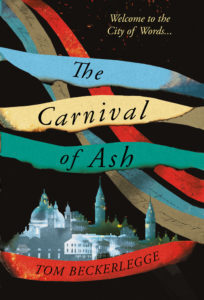 As Tom Becker, I’ve been writing children’s books for more than 15 years, and this is my first adult novel. I’ve relished the chance to weave fact and fiction together; I hope that The Carnival of Ash brings Cadenza alive, and that readers can lose themselves in the twists and turns of its streets.
As Tom Becker, I’ve been writing children’s books for more than 15 years, and this is my first adult novel. I’ve relished the chance to weave fact and fiction together; I hope that The Carnival of Ash brings Cadenza alive, and that readers can lose themselves in the twists and turns of its streets.
BUY THE BOOK: mybook.to/CarnivalofAsh Hardback, ebook, audiobook
Find Tom on Twitter: @Tbeckerlegge
Tom’s website: https://tombeckerlegge.wordpress.com/
The paintings of burning Rome are by Hubert Robert, an 18th Century artist who spent eleven years in Rome. (Wikipedia)
The post The Carnival of Ash by Tom Beckerlegge #Historical #Fantasy #Renaissance first appeared on Deborah Swift.




